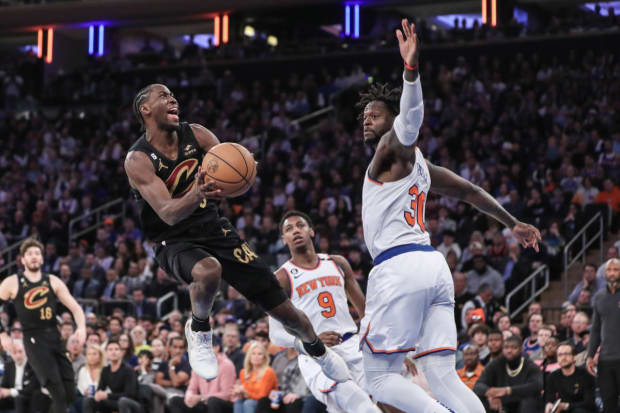Up until the playoffs began, the 2022–23 campaign was a bit of a dream season for the Cavs.
Fresh off the disappointment of barely missing out on a playoff berth the season prior, the club snuck in and pulled off an enormous deal for Jazz star Donovan Mitchell, someone who almost perfectly seemed to fit the young team’s upward trajectory and need for postseason experience.
With him joining fellow All-Stars Darius Garland and Jarrett Allen, and budding star Evan Mobley, coach J.B. Bickerstaff had an elite mix of playmaking on offense and rim protection on defense—a sign of things to come for a unit that would finish second in the NBA in net rating and fourth in the Eastern Conference standings. (Cleveland finished with the league’s best defense.) It all quieted a key concern that many outlets, this one included, had to begin the season: a question mark with the team’s fifth starter, and who, exactly, would fill that all-important spot, given the need to punish opposing clubs for overplaying Garland and Mitchell and, more importantly, to defend star wings like Jayson Tatum and Giannis Antetokounmpo.
Watch the Cavaliers with fuboTV. Start your free trial today.
We all know how it turned out. Pushed around by a more physical Knicks team, the Cavs got washed out in five games in the opening round of the playoffs. Bickerstaff ended up swapping out starting small forward Isaac Okoro for Caris LeVert after Game 2. And perhaps most troubling, the Cavs—who’d finished dead last among playoff-qualifying clubs in bench scoring at 28.7 points per game—got very little from their reserves during the first-round defeat. Cleveland made the choice to waive veteran big man Kevin Love, who still had skill (and the most playoff experience on the club despite having been moved out of the rotation), making them look downright strange, even if it was something the franchise’s longest-tenured player politely asked for.

Wendell Cruz/USA TODAY Sports
In light of all those things, Cleveland’s offseason has made plenty of sense. The Cavs certainly needed someone who could at least replicate Love’s skill set and experience, and they got exactly that, down to Love’s body type, in 30-year-old forward Georges Niang. (He reportedly got $26 million over the next three seasons.) Most noteworthy, though, was the choice to land 27-year-old Max Strus, the hard-nosed Heat wing who’s launched almost 10 triples per 36 minutes over his career while knocking down 37% of those looks. Both acquisitions should bolster an offense that connected on just 50 threes (10 per contest) during that first-round loss to the Knicks.
Still, we’ll see if those moves, combined with bringing back the free-agent LeVert, is ultimately enough. Opponents might still believe they’re capable of bullying the Cavs the way New York did under the glass last postseason. But internal growth and development is always possible, particularly for young stars like Mobley and Allen, who are 22 and 25, respectively.
Even with a core this young—Garland is 23, and Mitchell is 26—the clock is ticking on the experiment. (It feels like a critical year for Allen, specifically, in light of how last postseason played out. Does the team ultimately need two elite big men, or would they have better roster balance some other way?) Mitchell, the All-NBA guard who serves as the team’s biggest name, could opt out to become a free agent the summer after next. And Mobley, thanks to the new collective bargaining agreement, will be eligible for a rookie max extension in the near future.
Cleveland is a small-market team, but based on its regular-season success and the payroll number that’s on the way, the Cavs are almost certain to be in the deep end of the pool. Based on that, we’ll see if the top end of their roster still looks this way one year from now.







